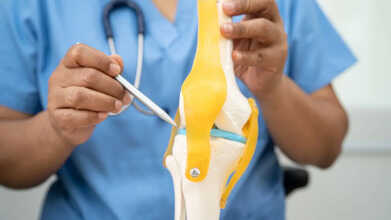- Health Conditions A-Z
- Health & Wellness
- Nutrition
- Fitness
- Health News
- Ayurveda
- Videos
- Medicine A-Z
- Parenting
How Do Weight-Loss Medications Reduce Food Cravings In The Brain?

Credits: Canva
A new wave of anti-obesity medications is transforming how people experience hunger. Rather than merely suppressing appetite, these drugs work by gently quieting the brain circuits that constantly drive us to eat.
The obesity medication tirzepatide, marketed as Mounjaro or Zepbound, appears to dampen brain activity linked to food cravings, according to a recent study. Researchers tracked the electrical signals in the brain of someone with severe obesity, who had persistent ‘food noise’ soon after starting the medication.
The study is the first to use electrodes to directly observe how blockbuster GLP-1–mimicking obesity drugs affect brain activity in humans, hinting at how they ease intense food cravings. But how exactly do these weight-loss medications work to reduce the ‘food noise’ in your mind?
We spoke with Dr. Nidhi Khandelwal, a leading Robotic & Laparoscopic Bariatric, Hernia & GI Surgeon | Mumbai MS, FIAGES, FALS (Bariatrics), FALS (Robotics), to understand more.
Can Weight Loss Drugs Suppress Food Craving In Your Brain?
Casey Halpern, a neurosurgeon-scientist at the University of Pennsylvania, and his team did not initially set out to study obesity drugs’ effects on the brain. Their goal was to see if deep brain stimulation—a therapy delivering a mild electrical current directly into the brain, could reduce compulsive eating in people with obesity who did not respond to treatments like bariatric surgery.
For the study, participants had electrodes implanted in their nucleus accumbens, a brain region involved in reward. This area also contains GLP-1 receptors, explains Christian Hölscher, a neuroscientist at the Henan Academy of Innovations in Medical Science, Zhengzhou, China, “so we know GLP-1 influences reward circuits.” The electrodes can both record electrical activity and deliver currents as needed and are already used to treat some epilepsy cases.
For the first two participants, intense food-noise episodes coincided with spikes in low-frequency brain activity, suggesting that these signals could indicate compulsive food cravings.
The third participant, a 60-year-old woman, had just started a high dose of tirzepatide—prescribed for type 2 diabetes—when her electrode was implanted. “We took advantage of this chance because of the excitement around these medications,” Halpern says. In the following months, her urges to binge eat disappeared. “It was remarkable to see the absence of food noise in someone with a long history of cravings,” he adds. “Equally striking was the silence in the nucleus accumbens, as seen in the electrical readings from that area.”
How Do Weight Loss Drugs Help With Food Cravings?
Many people struggling with weight describe a constant ‘buzz’ in their minds, preoccupied with thoughts about their next snack, cravings for sweets, or planning meals even when not hungry. This is often called “food noise.” These medications help quiet that constant chatter.
Dr. Khandelwal explains, “They send signals to the brain similar to what naturally happens after a satisfying meal. People feel full faster, stay satiated longer, and don’t experience the same urge to snack constantly. The mind feels clearer, and the emotional pull of comfort foods becomes easier to manage.”
She also noted another benefit: the ability to make better food choices, like selecting a healthier meal or stopping when full. Goals that once felt impossible now feel achievable and more natural. For many, the biggest change is not only weight loss but also the relief of finally having mental peace from constant cravings, which supports healthier habits.
However, Dr. Khandelwal emphasizes that these medications should only be used under the supervision of a specialist in obesity management.
Death Cap Mushroom Poisoning Claims California Resident’s Life: Symptoms And Risks Explained

Credits: Canva
A California man died last weekend after eating so-called death cap mushrooms, marking the third fatality linked to the toxic fungi in the state since November.
Health officials say California is seeing an unusually high number of mushroom poisonings this season. Between November 18 and January 4, at least 35 cases were reported statewide. In a typical year, the number is usually fewer than five.
“This year’s figures are far beyond what we normally see,” said Sheri Cardo, a communications specialist with the California Department of Public Health.
California Resident Dies After Eating Death Cap Mushrooms
At least three people have now lost their lives in California due to death cap mushroom poisoning since November. Media reports indicate a sharp rise in cases tied to foraged wild mushrooms, with more than 35 poisonings recorded over the past three months.
“The numbers we’re dealing with this year are comparatively off the charts,” Cardo told NBC News.
The most recent death occurred in Sonoma County and was the first fatal wild mushroom poisoning reported there this season, according to county health officials.
Dr. Michael Stacey, interim health officer for Sonoma County, urged residents to avoid eating wild mushrooms unless they are purchased from reliable grocery stores or licensed sellers. He warned that death cap mushrooms can look strikingly similar to safe, edible varieties.
What Is Death Cap Mushroom Poisoning?
Death cap mushrooms, scientifically known as Amanita phalloides, are among the most poisonous mushrooms in the world. They commonly grow beneath oak trees and can be found in parks, gardens, and wooded areas.
Experts say these mushrooms are often mistaken for edible types because of their appearance. Typical features include:
- A smooth cap that may appear whitish, pale yellow, light brown, or green
- White gills underneath the cap
- A white spore print
- A cup-like structure called a volva at the base of the stem
- A ring, known as an annulus, around the stem
Death Cap Mushroom Symptoms
Symptoms usually begin between six and 24 hours after ingestion. Early signs often include stomach pain, nausea, vomiting, and diarrhoea.
In many cases, symptoms ease or disappear after one or two days, which can create a false sense of recovery. By that point, however, the toxins may have already caused severe damage to the liver.
According to experts, the poison responsible, known as amatoxin, can seriously harm the liver, kidneys, and digestive system. Without prompt treatment, the damage can be fatal.
U.S. Poison Centers receive an average of about 52 calls each year related to amatoxin exposure, said Hallen-Adams, though not every case is officially reported.
Is the Risk Easing?
The danger may now be starting to decline in parts of California. Mike McCurdy, president of the Mycological Society of San Francisco, said he has noticed far fewer death cap mushrooms during recent foraging trips.
Earlier this winter, McCurdy said he spotted hundreds of death caps during a two- to three-hour walk in Sonoma County. On a recent outing near Lafayette, California, he found just one. “I think we’re getting close to the end,” he said.
Do You Wear Contact Lenses? This Rare Eye Parasite Can Permanently Damage Your Vision

Credits: Canva
Nearly four years ago, Teresa Sanchez was in Mexico for a medical procedure when her right eye began to feel unusually dry and irritated. At first, it seemed minor. She assumed her contact lens might be torn or that the switch from daily lenses to monthly ones was causing dryness. She even wondered if her body was fighting off an infection, as per CNN.
What she did not realize at the time was that a microscopic organism was slowly attacking her cornea. Over the next three months, the parasite caused irreversible damage to her vision and triggered searing pain that spread across her head.
“I couldn’t even keep the blinds open in my room,” said Sanchez, now 33 and living in Las Vegas. “Light would cause unbearable pain. That’s when I knew something was seriously wrong.”
By then, she had already seen multiple optometrists and had been misdiagnosed. Frustrated and desperate for answers, Sanchez began researching her symptoms on her own.
What Is Acanthamoeba Keratitis?
Online searches led Sanchez to a condition she had never heard of: acanthamoeba keratitis. An eye specialist later confirmed it. Keratitis refers to inflammation of the cornea, the clear, dome-shaped layer at the front of the eye that plays a central role in focusing vision. Acanthamoeba is a microscopic, single-celled organism that cannot be seen without a microscope.
According to Dr. Jacob Lorenzo-Morales, a professor of parasitology at the University of La Laguna in Spain, acanthamoeba is commonly found in soil and water. It does not require a host to survive, which makes it especially resilient.
Once the organism comes into contact with the eye, it can attach itself to the cornea. Dr. Paul Barney, an optometric physician and director at the Pacific Cataract and Laser Institute in Alaska, explained that even tiny breaks in the corneal surface can allow the parasite to burrow deeper into the eye.
Why Contact Lens Wearers Face Higher Risk?
Acanthamoeba keratitis is considered rare. Based on data from 20 countries, including the UK, India, the US, Canada and Brazil, there are more than 23,000 cases worldwide each year. Yet a striking pattern stands out. Between 85% and 95% of people who develop the infection wear contact lenses.
Contact lenses can cause microscopic abrasions on the cornea, creating an entry point for the parasite. The organism can also cling to the lens itself or become trapped between the lens and the eye, making it easier to penetrate the corneal tissue.
“If it’s not diagnosed early and treated aggressively, the outcome can be devastating,” Barney said. “The parasite feeds on the cornea, triggering inflammation and tissue damage that can lead to permanent vision loss.”
In some cases, vision can be partially restored with treatment. Others require a corneal transplant.
A Parasite Built To Survive
Treating acanthamoeba keratitis is especially difficult because the organism has strong defense mechanisms. It can sense threats and respond by forming a cyst, allowing it to lie dormant for months or even years.
This resilience means treatment often stretches over long periods and involves intense discomfort. Because the eye is extremely sensitive, patients must work closely with specialists and strictly follow treatment instructions.
Why The Condition Is Often Missed?
Early diagnosis is one of the biggest challenges Because acanthamoeba keratitis is uncommon, many optometrists may not recognize it right away. As a result, many contact lens users only learn about the condition after they develop it or come across viral videos discussing it online.
Many patients have expressed surprise that they were never clearly warned about the risks of wearing contacts while showering or swimming.
The Contact Lens Society of America emphasized that contact lenses are medical devices and require strict hygiene. This includes avoiding water exposure during swimming, showering or sleeping. The organization also stressed the importance of patients asking questions and carefully reviewing care instructions.
Acanthamoeba Keratitis: Symptoms That Mimic Other Eye Infections
In addition to severe pain and light sensitivity, acanthamoeba keratitis can cause redness, blurred vision, dryness, excessive tearing and the sensation that something is stuck in the eye.
Because these symptoms overlap with other conditions, misdiagnosis is common. Barney said the infection is frequently mistaken for herpes simplex keratitis, a major cause of infection-related blindness. In its earliest stages, it can even resemble pink eye.
That was the case for Sanchez. Her first optometrist diagnosed pink eye. The prescribed drops blurred her vision. A second optometrist suspected a bacterial infection, and while antibiotic drops offered brief relief, she soon lost vision in the affected eye.
Acanthamoeba Keratitis: How To Reduce Your Risk?
Experts stress that contact lens hygiene is critical. Always clean and store lenses using approved contact lens solution, never water. The solution in your lens case should be replaced daily. Wash and dry your hands thoroughly before handling lenses.
Sleeping in contact lenses should be avoided, as it increases dryness, irritation and the risk of corneal damage. Daily disposable lenses may lower infection risk compared to monthly lenses.
For water-based activities, glasses or prescription goggles are safer options. Some people may also consider vision correction surgery after discussing risks and suitability with a doctor.
Taking NSAIDs For Osteoarthritis? NHS Shares An Important Warning

Credits: Canva
More than 10 million adults, young people, and children in the UK are currently living with arthritis, according to a 2025 report by Arthritis UK. The NHS says osteoarthritis is the most common form of the condition across the country.
NHS Issues Warning For People Taking NSAIDs For Osteoarthritis
Osteoarthritis develops when joints become stiff and painful over time. Symptoms vary widely depending on the joint involved and the severity of damage. While medication is often used to manage pain and inflammation, the NHS warns that some commonly used treatments can carry risks if not taken correctly.
One of the most widely used options for pain relief is NSAIDs, a group of medicines many people rely on daily.
What Are NSAIDs And Why Are They Prescribed?
NSAIDs, or non-steroidal anti-inflammatory drugs, are commonly prescribed by GPs to relieve pain, swelling, and inflammation. They are available in several forms, including tablets, capsules, suppositories, creams, gels, and injections. Some NSAIDs can be bought over the counter, while stronger versions require a prescription.
Common types of NSAIDs
The most commonly used NSAIDs include:
- ibuprofen
- naproxen
- diclofenac
- celecoxib
- mefenamic acid
- etoricoxib
- indomethacin
- aspirin for pain relief (low-dose aspirin is not usually classed as an NSAID)
Doctors usually advise which NSAID is suitable and explain the potential benefits and risks. However, the NHS stresses that patients should also understand possible side effects and when to seek medical help.
NHS Warning On Who Should Be Cautious With NSAIDs
The NHS advises that NSAIDs may not be suitable for everyone. Extra caution is needed if you have asthma, stomach ulcers, angina, or if you have previously had a heart attack or stroke. People taking low-dose aspirin should always speak to their GP before using an NSAID.
Who Should Avoid Or Seek Advice Before Taking NSAIDs?
You should consult a pharmacist or doctor before using NSAIDs if you:
- are over the age of 65
- are pregnant or trying to conceive
- are breastfeeding
- have asthma
- have had an allergic reaction to NSAIDs in the past
- have a history of stomach ulcers
- have heart, liver, kidney, blood pressure, circulation, or bowel problems
- are taking other medicines
- are buying medicine for a child under 16 (aspirin should never be given to children under 16)
The NHS explains that NSAIDs are not always completely avoided in these cases, but they should only be used with medical advice, as the risk of side effects may be higher.
If NSAIDs are unsuitable, doctors or pharmacists may recommend alternatives such as paracetamol.
Possible Side Effects Of NSAIDs
Over-the-counter NSAIDs generally cause fewer side effects than prescription-strength versions. However, risks increase when they are taken at high doses, used for long periods, or taken by older adults or people with underlying health conditions.
Possible side effects include:
- indigestion, stomach pain, nausea, and diarrhoea
- stomach ulcers, which can lead to internal bleeding and anaemia
- headaches
- drowsiness
- dizziness
- allergic reactions
In rare cases, NSAIDs can affect the liver, kidneys, heart, or circulation, and may increase the risk of heart failure, heart attacks, or strokes.
Taking NSAIDs Alongside Other Medicines
It is essential to seek medical advice before taking NSAIDs if you are already using:
- another NSAID
- low-dose aspirin or warfarin
- ciclosporin
- diuretics for high blood pressure
- lithium
- methotrexate
- selective serotonin reuptake inhibitors (SSRIs) such as citalopram or fluoxetine
Signs And Symptoms Of Osteoarthritis
Common symptoms of osteoarthritis include joint pain, stiffness, and difficulty moving the affected joints. Some people may also experience:
- swelling
- joint tenderness
- a grating or crackling sensation when moving joints
- pain and stiffness after periods of inactivity
- enlarged or knobbly joints
- reduced range of movement
- muscle weakness or muscle loss
The NHS notes that osteoarthritis can affect almost any joint but most commonly involves the knees, hips, and small joints of the hands. Anyone with persistent symptoms should see their GP for diagnosis and treatment advice.
Even people who do not fall into higher-risk groups should only use NSAIDs as directed by a healthcare professional. Side effects can still occur, especially with long-term use. If NSAIDs are not appropriate, safer alternatives may be suggested to manage pain effectively.
© 2024 Bennett, Coleman & Company Limited

